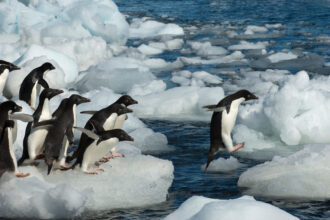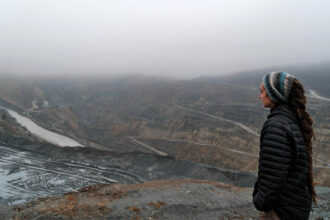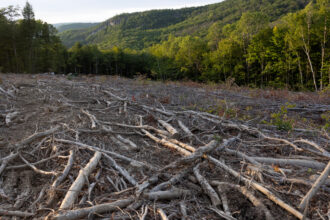Tonga, a Pacific Island nation with deep connections to the ocean and its non-human inhabitants, could become the first country in the world to recognize that whales have inherent rights.
Speaking in Nice, France, where the United Nations Ocean Conference is taking place, Tongan Princess Angelika Lātūfuipeka Tukuʻaho called for the recognition of whales as legal persons.
“The time has come to recognize whales not merely as resources but as sentient beings with inherent rights,” Lātūfuipeka Tukuʻaho said.
The announcement indicated that Tonga, a constitutional monarchy, could move forward with recognizing whales as legal persons and appointing human guardians to represent them in court.
“This would effectively give whales agency within the legal system, allowing them to assert and defend their own rights,” said Grant Wilson, executive director of the U.S.-based advocacy group Earth Law Center, which is not involved in the initiative.
Legal personhood is a mainstream legal concept most often used for corporations, allowing them to enter into contracts, sue and limit the liability of shareholders. Legal systems also allow for the representation of individuals who cannot act on their own behalf—such as children or incapacitated adults—through mechanisms like guardianship.
Melino Maka, chair of Huelo Matamoana Trust, has worked on the initiative with Lātūfuipeka Tukuʻaho and said the trust is engaged with legal experts to propose the “Whales (Legal Personhood and Protection) Act 2025,” building on Tonga’s legacy as a whale sanctuary.
The trust is working with Tongan ministries and lawmakers on advancing the legislation, Maka said, adding that part of the process is ensuring alignment between the draft legislation and “Tonga’s Christian and cultural foundations to ensure broad support.”
Key provisions in the bill include recognition of whales as legal persons and their rights to life, migration, a healthy habitat and cultural protection; establishment of a guardianship framework; and legal enforcement powers, including the right to initiate legal proceedings to protect whales. Once the draft is refined, Maka expects it to be formally introduced into Parliament.
“This is an important moment for Tonga and the broader Pacific in the movement to advance ocean justice and Indigenous-led environmental law,” Maka said.
Michelle Bender, legal counsel and head of ocean rights at Ocean Vision Legal, is one of the lawyers working on the draft legislation. She said in a written statement that the bill’s guardianship provision would create a bipartisan body of government officials, as well as Indigenous and local community members. The guardians would be empowered to recommend conservation actions and represent whales in legal proceedings and decision-making processes that affect them.
That includes environmental impact statements evaluating the effects of development proposals, which would evolve “EIAs away from being a mechanism that encourages development to one that protects the environment and human (Indigenous) rights and diverse values,” Bender said.
The bill, according to Bender, also emphasizes the social and cultural components of environmental decisionmaking, by incorporating consultations with Indigenous people and local communities into the environmental impact assessment process.
Bender said she’s working with the law firm Simmons & Simmons and the Pacific Whale Fund to advance similar legislation in other Pacific Island countries.
Mere Takoko, co-founder of the Pacific Whale Fund, said Tonga could draw on model legislation her organization and Bender’s team have worked on called Te Mana o Te Tohorā, meaning “the authority of the whale.”
That draft legislation, Takoko said, brings together Western law and Polynesian cosmology, including concepts like Mana, or authority including spiritual power, and the idea that humans are part of nature and nature is part of humans.
“Our ancestors have always known that the whale holds the mauri, the life force of the oceans, and that’s our ultimate way that we measure the health of the ocean,” said Takoko, who is Indigenous Māori. “If you have an abundance of whales, you have an abundance of all ocean life.”
Other provisions in the Te Mana o Te Tohorā draft legislation include a series of rights tailored to whales, like the right to have freedom of movement and protection from pollution.
“We ultimately just want to ensure that the whale is free to be the whale,” Takoko said. “So, these kinds of legal frameworks are very important to manage humans.”
Tonga’s announcement is part of a flurry of developments happening at the Ocean Conference aimed at advancing legal rights for the ocean and its species, and is part of a broader global rights of nature movement. That movement, progressing in dozens of countries, is advancing the understanding that ecosystems, wildlife and the Earth are living beings with inherent rights to exist, evolve and regenerate.
“If you have an abundance of whales, you have an abundance of all ocean life.”
— Mere Takoko, Pacific Whale Fund
Panama, Spain, Ecuador and Bolivia are among the countries that have such laws on the books. In other places, like Colombia and India, court rulings have recognized nature’s rights. Advocates behind the movement say that unlike conventional environmental protections, which largely regulate the amount of allowable pollution, rights of nature laws take a preventative approach.
The laws typically require governments to protect species’ or ecosystems’ ability to maintain their natural processes. Anyone who wishes to engage in an activity that might threaten that must provide proof that their activities won’t imperil critical processes, like a species’ ability to reproduce or a river’s ability to flow.
Tonga’s draft legislation would require companies to show “that their activity allows the vital cycles, processes and functions of whale populations and their habitats to continue,” Bender said. “If the activity may jeopardize the existence of whale populations it must be expressly prohibited.”
If that sounds like a profound shift, that’s because it is.
Much of the momentum behind the rights of nature movement is generated by a widespread belief that existing laws have failed to stop Earth’s multiple environmental crises—including severe damage to Earth’s oceans. There is near complete political and scientific consensus that climate change and other human activities are ravaging the oceans—and why many whale species are endangered or threatened.
Lātūfuipeka Tukuʻaho’s announcement underscored the need for a sweeping change. Whales’ survival, she said, “demands a transformative shift in our legal and ethical relationship with the ocean.”
The princess’s remarks were made during a speech she gave before the One Ocean Science Congress, an event aimed at providing scientific insights about the ocean’s health to global policymakers.
In recent years, the rights of nature movement has taken off in the ocean space, led by Indigenous peoples and, in some cases, by scientists.
Last year, Indigenous leaders from New Zealand and the Cook Islands signed a treaty recognizing whales as legal persons with a right to a healthy environment, among other rights. That treaty, known as the He Whakaputanga Moana (Declaration for the Ocean), was led by the late Māori King Tūheitia Pōtatau Te Wherowhero VII and founded by the Māori organization Hinemoana Halo Partnership Fund. The treaty is entirely among Indigenous nations and based on Indigenous law.
“For Māori, legal personhood is not a foreign concept,” said Lisa Tumahai, co-chair of the Hinemoana Halo Partnership Fund. Tumahai added that draft legislation, parallel to the existing treaty, is slated for introduction into New Zealand’s legal system.
In recent years, Māori tribes have won groundbreaking legal settlements with the New Zealand government that have established legal personhood arrangements for the Whanganui River, a forest (Te Urewera) and a mountain (Mount Taranaki).
Tumahai, who is Māori, said attendees at this week’s oceans conference have the opportunity to view, read and sign the He Whakaputanga Moana treaty. People not at the conference interested in signing the treaty can contact her through her group’s website.
For Māori, and some other Indigenous communities worldwide, the ocean and its diverse life hold deep cultural and spiritual significance. The Lummi Nation, in the U.S. Pacific Northwest, calls orcas Quahamitchtan, meaning “people under the sea,” for instance, and some Lummi people have actively campaigned to recognize orcas’ rights. For Māori people, whales are seen as ancestors or relatives.
That’s why the rights of nature movement is not just a legal campaign, but also a cultural and moral one, according to Wilson, of the Earth Law Center. “How can we continue to define an ancestor or relative as mere legal property?” he said.
Looked at another way, runaway climate change and other human-caused degradation to Earth’s oceans deeply threatens the cultures and livelihoods of scores of Indigenous peoples and other communities. Most of them have never accepted Western ideas that humans are separate from nature and that all nonhuman parts of the Earth are human property.
The ideas behind the rights of nature movement are winning over mainstream conservation groups, including the International Union for Conservation of Nature and Natural Resources, which has put out a resolution on the rights of nature. The organization has set up a rights of nature task force, which is exploring the notion of oceans’ rights, according to Minna Epps, IUCN’s global ocean policy director. Epps said the idea of oceans’ rights isn’t yet mainstream, but “it’s gaining traction.”
At this year’s U.N. Ocean Conference, advocates have supported a campaign launch on the rights of coral reef ecosystems, a push to recognize the rights and intrinsic value of the ocean in the conference’s outcome document and an oceans’ rights legal toolkit. There are also campaigns for Antarctica, deep-sea species, the Venice Lagoon and the Mediterranean bioregion, among others.
Inside Climate News’ Teresa Tomassoni contributed to this report.
This story was updated June 11, 2025, to include two new interviews, remove an incorrect location for the Pacific Whale Fund and correct the name of the draft legislation.
About This Story
Perhaps you noticed: This story, like all the news we publish, is free to read. That’s because Inside Climate News is a 501c3 nonprofit organization. We do not charge a subscription fee, lock our news behind a paywall, or clutter our website with ads. We make our news on climate and the environment freely available to you and anyone who wants it.
That’s not all. We also share our news for free with scores of other media organizations around the country. Many of them can’t afford to do environmental journalism of their own. We’ve built bureaus from coast to coast to report local stories, collaborate with local newsrooms and co-publish articles so that this vital work is shared as widely as possible.
Two of us launched ICN in 2007. Six years later we earned a Pulitzer Prize for National Reporting, and now we run the oldest and largest dedicated climate newsroom in the nation. We tell the story in all its complexity. We hold polluters accountable. We expose environmental injustice. We debunk misinformation. We scrutinize solutions and inspire action.
Donations from readers like you fund every aspect of what we do. If you don’t already, will you support our ongoing work, our reporting on the biggest crisis facing our planet, and help us reach even more readers in more places?
Please take a moment to make a tax-deductible donation. Every one of them makes a difference.
Thank you,













